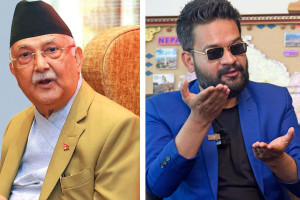Columns
Pathos of vulnerable narcissism
Borders between political entities with a shared civilisational heritage are transitional.
CK Lal
Just as the film was officially released, Mayor Balendra Shah of Kathmandu Metropolitan City issued an ultimatum to the makers of mythical flick Adipurush. Mayor Shah warned them that unless a portion of the dialogue that referred to Sita as Bharat ki beti—meaning “a daughter of India”—was removed from the Bollywood blockbuster altogether, no Hindi film would be allowed to run in the metropolis.
Terrified by the diktat of a “partyless” populist with no political restraint on his whims, owners of cinema halls in the metropolis have suspended all shows of Hindi films for now. The menace has since begun to spread and Mayor Dhanraj Acharya of Pokhara has already issued a similar fiat to ban Hindi film shows. The possibility of other pseudo nationalists jumping on the jingoistic bandwagon can’t be ruled out.
With little else to establish their credibility, politicos of Nepal seldom lose an opportunity to flaunt their “nationalistic” credentials. Patriotism may have been “the last refuge of the scoundrel” for Samuel Johnson; but for every busybody and badass in Nepal, nationalism is the first bolthole after any demonstration of unwarranted bellicosity.
The unnecessary controversy over a multi-star but mediocre movie in a relatively small market is unlikely to hit the bottom line of its makers. The flick is reportedly doing well at the box-office. Nepali audiences too are unlikely to lose much by not being able to watch yet another propaganda picture of Hindutva politics. But this sordid episode does show at least two things—the risk of patriotism being used as a shield to hide collective inadequacies of an insecure society, and the danger of vulnerable narcissism of the populace being whipped up to foist yet another demagogue on the polity of the country.
Handlers of Mayor Shah in the permanent establishment of Nepal (PEON) seem to be playing upon the insecurities, ignorance and ambitions of the political newbie with panache. Mayor Shah has played the scripted character of a maverick city father extremely well so far. Perhaps his promoters are envisaging a bigger role for him in politics, and nothing succeeds like the call to nationalism in establishing the credentials of a politician in a country suffering from collective narcissism.
Arrogant ignorance
The insignia of a double-triangle atop crossed khukuris on Mayor Shah’s iconic Bhadgaule cap notwithstanding, it is extremely unlikely that anyone from the Madheshi side of his family ever saw any active military service in the Gorkhali force anywhere in the world. Even though he has a lot of personal achievements to his credit—he has been a popular rapper and a successful consulting engineer before being elected as the city father—he appears to have an urge to constantly prove himself to his core constituency of deracinated urbanites.
Having been born and brought up in Kathmandu, Mayor Shah probably assumes that he also belongs here without realising that it’s extremely difficult for a first generation Madheshi to claim roots in a city as ancient as Kathmandu. Former President Rambaran Yadav was once alluded into believing that he was one of the inheritors of Gopalvanshi civilisation. It didn’t take him long to come face to face with the reality that he had merely been given a wax mask for the period of his utility which melted away in the heat of the third Madhesh Uprising.
In acts of passion without compassion, Mayor Shah began his term by mounting an attack on slum dwellers along the Bagmati River. It is possible that some of the unauthorised settlers are frauds and swindlers. But there must be some method even in the madness of setting things right in a hurry. The cruelty of metropolitan policy upon hapless hawkers—many of them Madheshis making a hand-to-mouth living in an unwelcoming city—is unlikely to have taken place without his clearance.
The decision to ban Hindi movies carries with it seeds of growing into ethnic hatred last seen during anti-Madheshi riots over something trivial that Hindi film star Hrithik Roshan had supposedly said but had never actually said what he was alleged to have said. The cartographic one-upmanship of Akhand Bharat and Greater Nepal are useful fictions that nobody in their right mind find believable. Stories, however, touch the heart and moves a person towards action that may have unintended consequences.
Everyone knows that the historic Buddha of the Shakya kingdom or Princess Sita of Mithila in Videha kingdom don’t need Aadhar Card or citizenship certificate from contemporary states of India and Nepal. The 10-yard strip of no man’s land between what was then the East India Company, and the kingdom of Nepal is a creation of political settlements in the wake of the Sugauli Treaty. The section in Mithila was bequeathed to the defeated Gorkhali elite by the victors to buy their loyalty.
There is no need to be riled up when a Maithil from Bihar in India says that Sita is their daughter or an Awadhiya from Uttar Pradesh claims that Buddha is also theirs. Commercial considerations come into play when Lumbini and Sarnath or Bodhgaya vie for the business of faithful Buddhists, but the Light of Asia is a shared heritage of two unequal but equally proud members of the comity of nations in the modern world.
It requires self-confidence combined with a sense of humility to accept that borders between political entities with a shared civilisational heritage are transitional. In an attempt to be a true “mimic man”, Mayor Shah has unnecessarily pulled nationalism—one’s unconditional love for the mother, the motherland and mother tongue—to the level of cultivated hatred for the imagined other.
Useful lies
Hyper nationalism is the conviction in superiority of one’s nation and has no place for self-examination of one’s beliefs or productive engagement with others. The idea of collective narcissism adds another dimension to the delusion—an unfounded belief that “the exaggerated greatness of one’s group is not sufficiently recognised by others”.
Nepal had to surrender to the East India Company through the Sugauli Treaty and accept tributary status of the Qing Emperor after the Treaty of Betrawati. Nepalis were never directly colonised because neither the British nor the Chinese considered it worth their while to colonise a mountainous country with little material or human resource.
Despite being one of the poorest countries in the world that had to survive on remittances from the export of untrained warriors and unskilled labour in difficult times, some Nepalis continue to believe that neighbours have their covetous eyes upon their water resources, uranium deposits, fertile plains and sacred hills. According to Surendra Yadav, the Director General of Department of Passport, everyday 6,500 passports are issued to citizens that want to get out of the country at the very first opportunity. But hyper nationalists truly believe that the citizenship of their country is the most coveted document in the world.
Psychologists have since identified that vulnerable narcissism involves “a fragile, uncertain sense of self-worth, deeply steeped in shame and distrust, along with the typical antagonism and self-entitlement.” It sums up the sense of an idiom in Indian English: “We are like that only.”




 10.12°C Kathmandu
10.12°C Kathmandu















